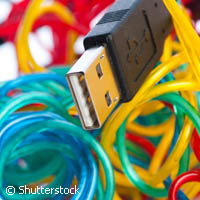Electric idea garners fresh support in Europe's ICT industry
Several major European ICT (information and communication technologies) companies have joined their peers in a shared voluntary commitment to promote energy savings in Europe's ICT sector. The recent 'ICT 2010: Digitally Driven' conference in Brussels provided an ideal opportunity for more businesses to add their names to the long list of ICT companies which had already signed up to the relevant codes of conduct. A high-level signatory event on 28 September 2010 marked the occasion. This endorsement adds further momentum to the implementation of the Digital Agenda for Europe. Adopted in May 2010, the Digital Agenda notably encourages Europe's ICT sector to play a prominent role in the reduction of greenhouse gas emissions. The voluntary codes of conduct, which are managed by the European Commission's Joint Research Centre (JRC), enable Europe's ICT stakeholders to define actions that can help reduce ICT-related power consumption and improve energy efficiency throughout the sector. There are five codes of conduct in total, respectively related to broadband equipment, data centres, digital TV (television) services, efficiency of power supplies and AC (alternating current) uninterruptible power systems. The signatory event firmly placed the first two codes at the centre of attention. The code of conduct on broadband equipment, which was launched in 2007 for an activity that represents around 15% of the sector's total energy consumption, sets limits for the maximum power usage of various types of equipment used in consumer premises and in telecom operators' substations. These devices notably include modems, switches, routers and home gateways. Savings here are primarily achieved through the use of suitable low-energy components. Ten new signees adopted the code at the event: A1 Telekom Austria AG, Belgacom (Belgium), British Telecom, KPN (Netherlands), France Telecom-Orange, OTE (Greece), Portugal Telecom, Telefonica (Spain), Telenor (Norway), and Turk Telekom. This brings the coverage of the code to a total of 65 million broadband lines in the EU, which corresponds to 72%, plus another 10 million lines in Norway, Switzerland and Turkey. The code of conduct on data centres applies to data centre buildings, facilities and server communication equipment. Introduced in October 2008, it aims to curb the consumption of a rapidly growing activity which already accounts for 18% of the power used by Europe's ICT sector - approximately 56 TWh (terawatt-hour) of electricity per year. Belgacom, France Telecom-Orange, TDC Services, Telecom Italia, Telefonica and Turk Telekom used the opportunity to sign up to the code, which is already applied by 26 participants and supported by more than 100 endorsers. Máire Geoghegan-Quinn, the EU Commissioner for Research, Innovation and Science, said: 'The success of these codes of conduct shows industry's recognition that innovation to boost energy efficiency is a commercial, economic and environmental priority. It is a good example of the JRC's behind-the-scenes work to support the Europe 2020 Strategy.' With a total of 16 new signatures for the two codes combined, the drive to reduce power consumption in the ICT sector is picking up the pace. Signees undertake to reduce energy consumption by an agreed amount in a clearly defined timescale, through the adoption of best practices. ICT equipment and services currently account for more than 8% of the electrical power used in the EU and generate approximately 4% of the EU's CO2 emissions. Commenting on this new milestone, Neelie Kroes, Vice President of the European Commission for the Digital Agenda, said: 'Implementing these two codes of conduct will significantly reduce the EU's electricity consumption and could save EUR 4.5 billion per year. I welcome this work towards a more sustainable future.'
Countries
Austria, Belgium, Switzerland, Greece, Spain, France, Netherlands, Norway, Portugal, Türkiye, United Kingdom



